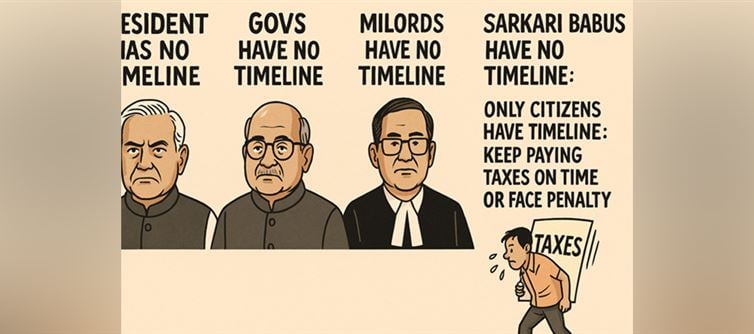
india just heard the supreme Court’s latest sermon on federalism — and let’s just say it wasn’t comforting. In a landmark ruling that will echo through every state legislature, the supreme court declared that neither the President nor the Governors can be forced to follow deadlines when granting assent to bills. No ticking clock. No constitutional stopwatch. No accountability mechanism.
But here’s the twist: while the top court condemned “prolonged and evasive inaction,” it also refused to fix any timelines — essentially shielding the highest offices from scrutiny while the ordinary citizen still gets SMS reminders for tax deadlines. If democracy is meant to be a system of checks and balances, india is now looking like a seesaw with all the weight on one side.
1. The supreme court Just Declared: Deadlines Are for Mortals, Not the Mighty
The five-judge bench, headed by outgoing CJI D.Y. Chandrachud, ruled that the judiciary cannot set deadlines for Governors or the President under Articles 200 and 201.
Translation?
Powerful offices get infinite time. Citizens get income-tax late fees.
“Deemed consent is unconstitutional,” the bench said — essentially ensuring Governors can take their sweet time, even when “sweet time” starts tasting like administrative rot.
2. Governors Can Sit on Bills Forever — and It’s Still “Constitutional”
States like tamil Nadu have been screaming about Governors turning bill assent into a waiting game. BJP-appointed Governors delaying opposition-ruled state bills is now a feature, not a bug.
The court criticized “evasive inaction.”
But what’s the punishment?
Nothing. The Constitution shrugs.
Delays continue. Governance stalls. Governors sip tea.
3. The President Also Gets Unlimited Time — Because Why Not?
The ruling extends to the President’s desk, too. No timelines, no consequences.
State bills can just float in constitutional limbo.
Meanwhile, citizens can’t delay:
Aadhaar-PAN linkage? Deadline.
Filing IT returns? Deadline.
GST payments? Deadline.
Property tax? Deadline.
Missing any? Penalty, fine, prosecution — pick your flavor.
4. Judges Also Have No Time Limit — The System Knows How to Protect Its Own
Pending cases?
Judgment reserved for months?
Are Collegium decisions taking ages?
Absolutely no statutory timeline.
But the moment your challan is unpaid for 10 minutes?
Pay ₹1,100, citizen. And don’t talk too much.
5. Bureaucrats Swim in Files Like It’s a Picnic — No Accountability Required
Sarkari Babus are masters of delay.
“File under process.”
“Forwarded to the concerned department.”
“Awaiting signature.”
It’s the national anthem of bureaucracy.
And now, with the supreme court shielding constitutional heads from clocks, bureaucratic delay has officially become a culture, not a flaw.
6. And Then There’s You — The Only One Who Must Follow Every Deadline or Face the Guillotine
The taxpayer.
The voter.
The citizen.
The backbone.
The ATM of the state.
You alone have deadlines.
Miss your tax payment? Penalty.
Miss your KYC update? Account freeze.
Miss a traffic fine? court summons.
You’re the only one required to “perform your duties” on time, while everyone above you gets the privilege of infinite procrastination.
7. “Mother of Democracy”? Maybe. But Accountability Is Still the Orphan.
india loves calling itself the “Mother of Democracy.”
Beautiful phrase.
But in the motherland of deadlines, accountability is always bottom-up — never top-down.
The powerful remain unreachable.
The bureaucratic elite remain untouchable.
The constitutional offices remain unquestionable.
And the citizen remains…
Taxpayer No. 452104921. Please deposit by the due date.
⚔️ FINAL WORD
The supreme Court’s ruling didn’t just protect constitutional offices — it exposed the nation’s biggest irony:
In india, the higher your power, the lower your accountability.
And the lower your power?
The tighter the deadline around your neck.




 click and follow Indiaherald WhatsApp channel
click and follow Indiaherald WhatsApp channel